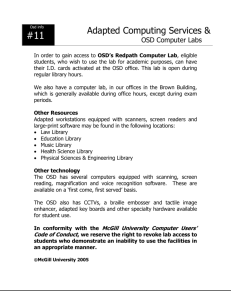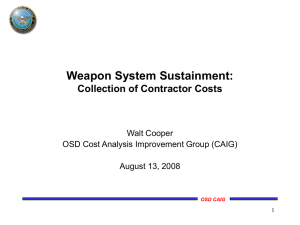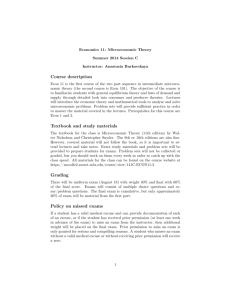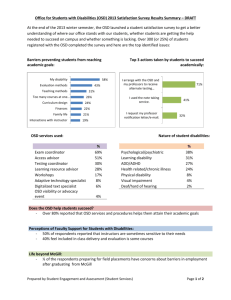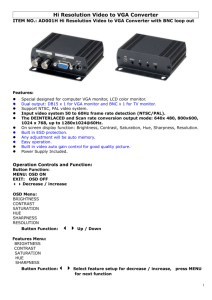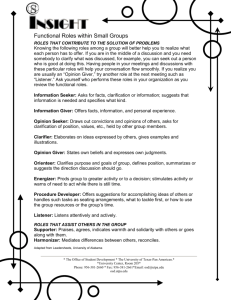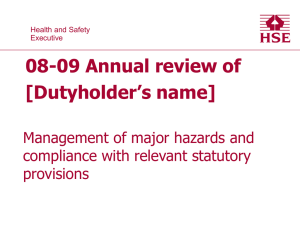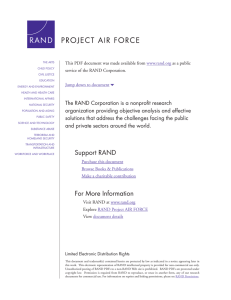CAIG Review of FCS Activities to Date
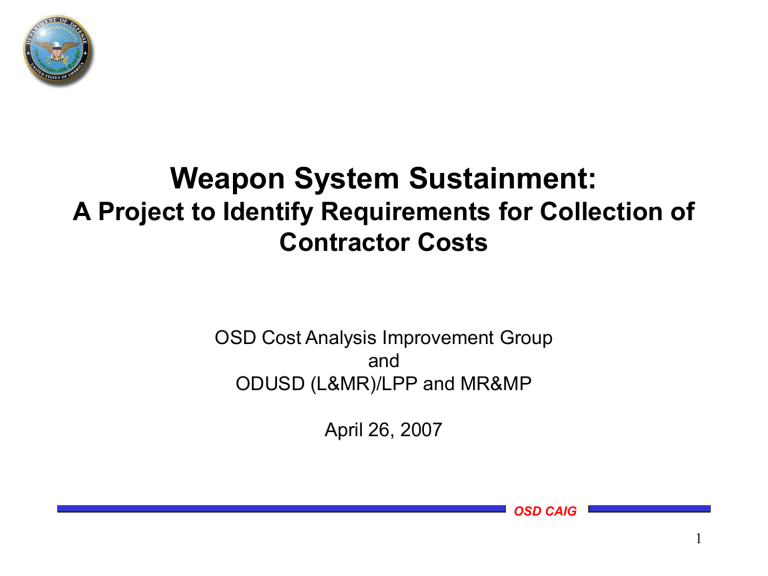
Weapon System Sustainment:
A Project to Identify Requirements for Collection of
Contractor Costs
OSD Cost Analysis Improvement Group and
ODUSD (L&MR)/LPP and MR&MP
April 26, 2007
OSD CAIG
1
Outline
• Context
• Purpose of the project
• Results to date
• Issues
• Next steps
OSD CAIG
2
O&S Costs Represent Largest Fraction of Life
Cycle Costs, by Far
Ground Combat Systems
4%
28%
Rotary Wing Aircraft
3%
24%
68%
73%
60%
Surface Ships
1%
39%
RDT&E
Fighter Aircraft
4%
25%
71%
Procurement
OSD CAIG
O&S
3
Major CAIG Responsibilities in O&S Costing
•
Preparation of independent cost estimates, per statute
• Reviews and analyses, e.g.,
– O&S Cost Guide
– Fully Burdened Cost of Fuel
– Budget and program displays -- depot maintenance, materiel system readiness
•
Oversight of Visibility and Management of Operating and Support Costs
(VAMOSC) program
– Establish policy
– Promote standardization of cost element structures across the Components
– Promote use of VAMOSC data to predict future costs
OSD CAIG
4
O&S Cost Analysts’ Major Responsibilities
• Preparation of life cycle cost estimates
• Formulation of budgets and programs
• Analysis of working capital funds
• Development of business case analyses
• Support of contract negotiations
Success depends on analysis of actual O&S costs organized in a standard O&S Work Breakdown Structure (WBS)
OSD CAIG
5
The O&S Work Breakdown Structure
1. Mission Personnel
– operators, maintenance personnel, staffs
2. Unit-Level Consumption – fuel/energy, consumable material and repair parts and depot-level reparables
3. Intermediate Maintenance
4. Depot Level Maintenance
– overhaul, re-work and other costs
5. Contractor Support – burdened cost of labor, material, and assets
6. Sustaining Support -- tools, test sets, modifications, sustaining engineering support and software maintenance
7. Indirect Support
OSD CAIG
URL: http://dcarc.pae.osd.mil/osd_ces/index.html
6
The Source of O&S Actuals:
Visibility and Management of Operating and Support Costs
(VAMOSC)
• Only source of ready data on actual operating and support (O&S) costs of weapon systems
• Evolution
– In 1974, Military Departments began developing programs for collection of actual O&S costs
– Initial systems largely manual
– In mid-1990s, Military Departments introduced automation
• Army OSMIS (Operating & Support Management Information System)
• Navy: Naval VAMOSC and USMC VAMOSC
• Air Force Total Ownership Cost (AFTOC)
– Today, VAMOSC systems are state-of-the-art information systems with growing numbers of users
• Data provided in standard WBS
OSD CAIG
7
Today’s VAMOSC Program
Number of systems tracked
Data sources
Active user accounts
Army
(OSMIS)
~1,400
Navy
(VAMOSC)
~1,740
35 138
Air Force (AFTOC)
> 200 weapons, hundreds of sub-systems
> 200 base operating accounts
14
1,500+ 720 600
More than 3,000 active users across DoD.
OSD CAIG
8
An Illustration – The Navy’s F-18C
($M, FY 2005 constant)
1.0 Mission Personnel
2.0 Unit Level Consumption
3.0 Intermediate Maintenance
4.0 Depot Maintenance
5.0 Contractor Support
6.0 Sustaining Support
7.0 Indirect Support
FY 2001
320
700
137
68
13
168
7
1,406
FY 2002
328
827
132
96
17
122
7
1,522
FY 2003
339
865
159
80
25
173
7
1,640
FY 2004
333
772
176
78
15
186
6
1,560
Historically, contractor support has represented a small percentage of O&S costs.
But that is changing…
FY 2005
337
761
200
131
17
236
6
1,682
OSD CAIG
9
Some Current Dynamics
•
Greater reliance on industry partners for sustainment
– Many forms -- traditional Contractor Logistics Support (CLS), PBL, DVD
– More use of public-private maintenance partnerships
– Establishment of Product Support Integrators
• Significant interest in the integration of acquisition and logistics strategies
– New, mandatory Key Performance Parameter (KPP): Materiel Availability
– Several mandatory Key System Attributes, including Ownership Cost
• Requirements for business case analyses of any proposed PBL strategies
To provide useful advice to decision makers, cost analysts must have detailed functional and cost information from contractors in sustainment arrangements.
OSD CAIG
10
About The Project
• Requested by OUSD (AT&L)
• Co-sponsored by OUSD (AT&L) and OSD CAIG
• Collaborative effort among OSD and all three Military
Departments
• Objective: To recommend policy and procedures for collection of contractor costs in weapon system sustainment arrangements
• To be completed by fall 2007
OSD CAIG
11
Project Approach
•
Understanding fully how contractors are providing sustainment support
– Scope
– Contract types
– Cost reporting
– Issues
•
Identify specific cost data requirements, e.g.,
– Frequency
– Formats
– Level of detail
• Vet with industry partners
• Formalize in next update of DoDI 500.2, “Defense Acquisition
Management Policies and Procedures”
OSD CAIG
12
Programs Reviewed
System/Program
C-17*
C-130J
F/A-18*
Guardrail Common
Sensor
Hunter UAV
Joint STARS*
LPD-17
AF
AF
Navy
Army
Army
AF
Navy
Dept Primary Contractor Key Points
Boeing Integrated
Defense Systems
Lockheed Martin
Total System Support
Responsibility (TSSR)
Boeing
DynCorp
TRW/Northrop Grumman
Many PBL-focused contracts
Total Life Cycle
Support
Standard CLS
Northrop Grumman
TSSR
Northrop Grumman
Focuses on technology upgrades, software support
OSD CAIG
* On-site discussions with PMO.
13
Programs Reviewed (Cont’d)
Dept System/Program
Navy Inventory Control
Point –- Philadelphia*
Predator UAV
Sentinel Air Defense
Radar*
Shadow UAV*
Stryker*
T-45TS Goshawk Training
Aircraft*
V-22 Engine
Navy
AF
Army
Army
Army
Navy
Navy
Primary
Contractors
Key Points
Various
General Atomics
Major user of PBL contracts
Traditional CLS
PBL
Raytheon
AAI Corp.
PBL
General
Dynamics Land
Systems
Boeing, BAE,
Rolls Royce
Army’s largest CLS arrangement
Extensive use of
PBL
Power-by-the-Hour TM
Rolls Royce
OSD CAIG
* On-site discussions with PMO.
14
Key Findings
• Contract scopes can address more than one function
– Total System Support Responsibility
– Product Support Integrator
– Use of public/private partnering agreements in depots is significant, and growing
• Most major contracts are firm fixed price
• Cost reporting reflects requirements in CLINs… tends to not conform to standard O&S cost WBS that cost analysts use
OSD CAIG
15
Cost Analysts’ Desired Outcomes
•
Periodic reports needed -- annual submissions preferred
– To be used for updating budgets and programs, analysis of Working Capital
Fund requirements
– Consistent with VAMOSC system updates
– However, must be synchronized with contract milestones
•
Program and contract plans consistent with CSDR
– O&S cost WBS plus…
– Reporting contractor’s G&A
– Other reporting contractor’s miscellaneous
– Reporting contractor undistributed budget
– Reporting contractor’s management reserve
– Reporting contractor’s FCCM
– Reporting contractor’s profit or fee
• Reports submitted directly to DCARC
Training program will be needed. Many issues still to be worked with
Military Departments and industry.
OSD CAIG
16
Issues to Address
• Collection of contractor cost data on fixed price contracts
• Reporting frequency
• WBS/Level of detail
• Compliance
OSD CAIG
17
Next Steps
• Resolve issues in IPT process
• Continue discussions with industry… Conduct follow-on discussions in August NDIA forum?
• Identify staffing requirements at Defense Cost and
Resources Center
• Draft policy memo… Pilot programs likely
• Update DoDI 5000.2 and O&S Cost Guide
OSD CAIG
18
